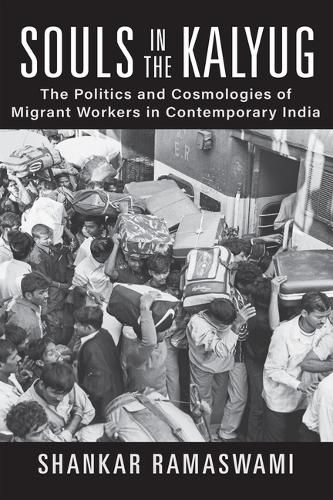Readings Newsletter
Become a Readings Member to make your shopping experience even easier.
Sign in or sign up for free!
You’re not far away from qualifying for FREE standard shipping within Australia
You’ve qualified for FREE standard shipping within Australia
The cart is loading…






How migrant workers in contemporary India strive toward, and at times realize, elements of a good life
The economic development process in India is one that has induced new difficulties and hardships into the lives of poor and working people despite its alleged achievements. In villages, farming families confront an agrarian crisis, with rising costs of seeds, fertilizers, and pesticides; low prices for crops in the face of grave indebtedness; and ecological damage to the soil, water, and forests. Due to the scarcity of jobs, many migrate to cities for work. Once in the city, migrants take on and must contend with low-paid, insecure, and hazardous work. And in urban neighborhoods, they deal with congested living conditions; poor qualities of air, water, and sanitation; and separation from their families in the village.
Souls in the Kalyug introduces readers to migrant workers who are confronting myriad hardships and asks how it is that these workers create lives that can become less injurious than their circumstances might suggest. Anthropologist Shankar Ramaswami proposes a three-part answer. In a metal factory in Delhi, migrant workers engage in resistance and collective struggle against perceived oppression and injustice. In the city and village, they weave connections to one another, building friendships in empathetic closeness and fellowship. In the metaphysical realm, they attempt to resist soul-distorting processes in our present, decivilizing times, or the Kalyug. Through these activities, migrant workers strive toward, and at times realize, elements of a good life.
Souls in the Kalyug ultimately presents a nuanced and intimate portrait of migrant workers through a complex study of entanglement and noncooperation in workers' worlds, and in its analysis of workers' politics, within and outside of labor unions, interpersonal relationships, and foundational religious and cosmological worldviews.
$9.00 standard shipping within Australia
FREE standard shipping within Australia for orders over $100.00
Express & International shipping calculated at checkout
How migrant workers in contemporary India strive toward, and at times realize, elements of a good life
The economic development process in India is one that has induced new difficulties and hardships into the lives of poor and working people despite its alleged achievements. In villages, farming families confront an agrarian crisis, with rising costs of seeds, fertilizers, and pesticides; low prices for crops in the face of grave indebtedness; and ecological damage to the soil, water, and forests. Due to the scarcity of jobs, many migrate to cities for work. Once in the city, migrants take on and must contend with low-paid, insecure, and hazardous work. And in urban neighborhoods, they deal with congested living conditions; poor qualities of air, water, and sanitation; and separation from their families in the village.
Souls in the Kalyug introduces readers to migrant workers who are confronting myriad hardships and asks how it is that these workers create lives that can become less injurious than their circumstances might suggest. Anthropologist Shankar Ramaswami proposes a three-part answer. In a metal factory in Delhi, migrant workers engage in resistance and collective struggle against perceived oppression and injustice. In the city and village, they weave connections to one another, building friendships in empathetic closeness and fellowship. In the metaphysical realm, they attempt to resist soul-distorting processes in our present, decivilizing times, or the Kalyug. Through these activities, migrant workers strive toward, and at times realize, elements of a good life.
Souls in the Kalyug ultimately presents a nuanced and intimate portrait of migrant workers through a complex study of entanglement and noncooperation in workers' worlds, and in its analysis of workers' politics, within and outside of labor unions, interpersonal relationships, and foundational religious and cosmological worldviews.